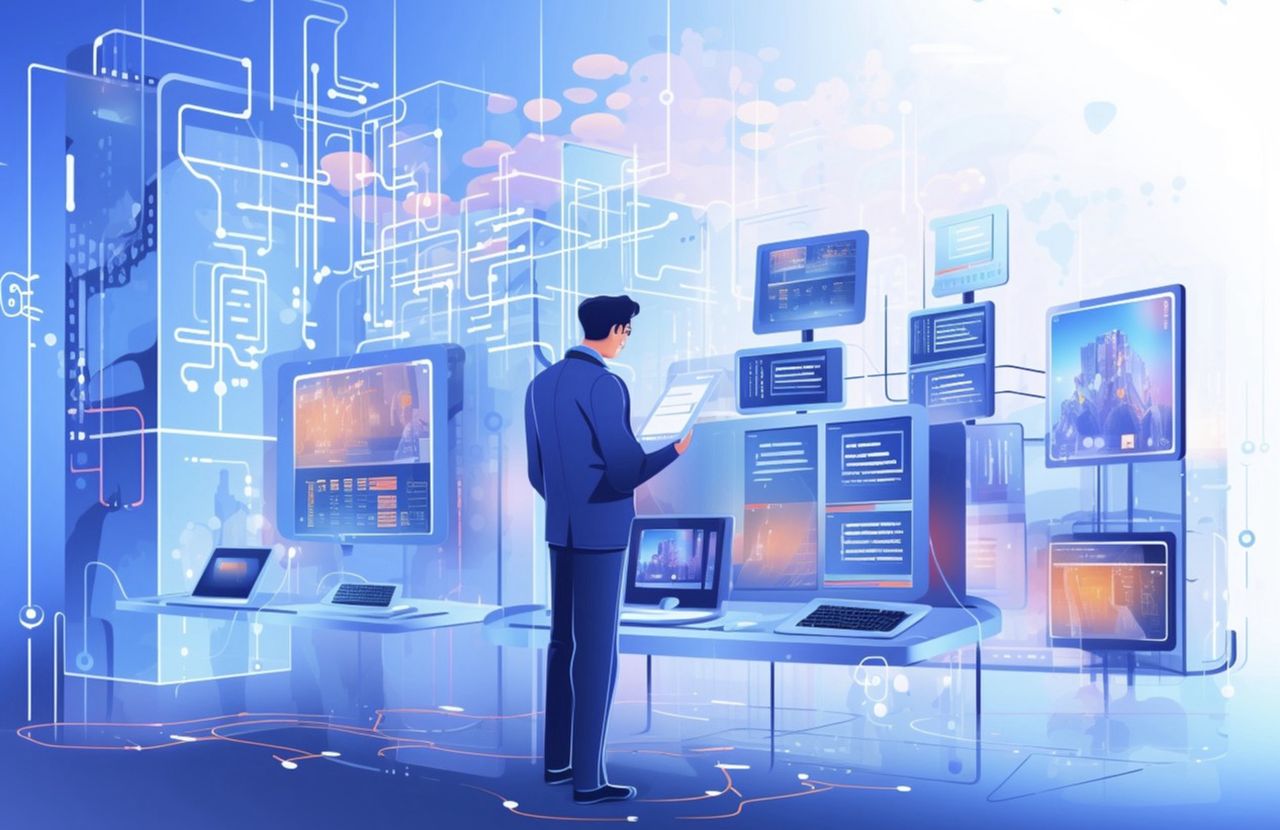In today’s fast-changing business technology landscape, understanding the differences between AI agents and traditional software is essential. Organizations aiming to optimize operations are finding that AI agents offer adaptive, efficient, and integrated solutions, standing apart from conventional software applications.
AI agents are specifically designed to be adaptive, learning from each interaction to deliver increasingly personalized and efficient results. Imagine software that not only responds to your needs but anticipates them—it’s a compelling shift in how we think about business technology.
Examining the unique qualities of AI agents highlights how these systems transform business operations. They go beyond simple automation, reshaping entire workflows, fostering integration across platforms, and reducing manual tasks. This technology shift enables you to concentrate on strategic decision-making and innovation, enhancing overall productivity.
AI Agents vs Software
TL;DR Key Takeaways :
- AI agents are transforming business operations with adaptive, efficient, and integrated solutions, unlike traditional software which operates within fixed parameters.
- Traditional software requires manual updates and often functions in isolation, necessitating manual data transfers between systems.
- Agents use machine learning and natural language processing to automate entire workflows and improve over time, enhancing customer interactions.
- Agents optimize processes in real-time, integrate seamlessly across platforms, and provide personalized responses, improving customer satisfaction.
- Agents are crucial for future business transformation, offering a competitive edge by enabling agile and responsive operations.
Traditional Software: The Foundation of Digital Business
Traditional software has long been the backbone of digital business operations. These applications are designed to perform specific tasks within predetermined parameters. They operate based on fixed algorithms and require manual updates for improvements or new features. Traditional software often functions in isolation, which can lead to information silos within an organization.
Key characteristics of traditional software include:
- Predictable behavior based on programmed rules
- Limited ability to adapt without human intervention
- Typically focused on specific, isolated tasks
- Requires manual data transfer between different systems
For example, a customer relationship management (CRM) system might store and organize customer data effectively, but it may not automatically sync with an email marketing platform. This limitation often necessitates manual export and import of data between systems, potentially leading to inefficiencies and data inconsistencies.
AI Agents: The Next Evolution in Business Technology
AI agents represent a significant leap forward in business technology. These sophisticated systems are designed to be dynamic and adaptive, continuously evolving through machine learning algorithms. AI agents can understand context using natural language processing (NLP), allowing them to interpret and respond to human language with remarkable effectiveness.
Key features of AI agents include:
- Continuous learning and improvement through machine learning
- Natural language processing for human-like interactions
- Ability to automate entire workflows, not just individual tasks
- Seamless integration across multiple platforms using APIs
Unlike traditional software that automates individual tasks, AI agents can manage entire processes from start to finish. For instance, an AI agent can handle customer inquiries across multiple channels, learning from each interaction to enhance future responses. This capability allows for a more holistic and efficient approach to business operations.
AI Agents vs Traditional Software What’s the Difference?
Uncover more insights about Machine Learning in previous articles we have written.
Operational Benefits of AI Agents in Business
The implementation of AI agents offers significant operational benefits for businesses. These intelligent systems can automate decision-making processes and optimize operations in real-time, leading to increased efficiency and reduced human error.
AI agents excel at:
- Integrating data across multiple platforms for comprehensive insights
- Delivering personalized responses based on stored interactions and preferences
- Analyzing large datasets to identify patterns and trends
- Providing actionable recommendations for strategic decision-making
By using these capabilities, businesses can create a more cohesive and efficient operational environment. For example, an AI agent could analyze customer interaction data across various touchpoints, identify common issues or preferences, and automatically adjust marketing strategies or product recommendations accordingly.
Enhancing Business Efficiency with AI Agents
The adoption of Agents can lead to substantial improvements in business efficiency. By automating complex tasks and workflows, these systems significantly reduce the need for manual intervention, allowing human resources to focus on higher-value activities.
Key efficiency gains include:
- Reduction in time spent on routine tasks
- Improved accuracy in data analysis and decision-making
- Enhanced customer experience through personalized interactions
- Faster response times to market changes and customer needs
AI agents break down silos between different software systems, creating a more integrated operational environment. This seamless flow of information enables businesses to make data-driven decisions quickly and effectively, responding to market changes with agility and precision.
The Future of Business Operations with AI Agents
As AI technology continues to advance, AI agents are poised to play an increasingly central role in shaping the future of business operations. Their ability to learn, adapt, and make complex decisions makes them invaluable tools for business transformation.
Organizations that embrace AI agents early may gain a significant competitive advantage. These technologies enable more agile and responsive business operations, allowing companies to:
- Anticipate market trends and customer needs
- Optimize resource allocation in real-time
- Develop innovative products and services based on data-driven insights
- Create more personalized and engaging customer experiences
As AI agents continue to evolve, they are set to redefine the landscape of business operations. Forward-thinking organizations should consider integrating these powerful tools into their strategic planning to stay ahead in an increasingly competitive and dynamic business environment.
In conclusion, while traditional software remains an important component of business technology, AI agents represent a significant leap forward in capabilities and potential. By understanding the distinctions between these technologies and using the strengths of AI agents, businesses can position themselves for success in the digital age.
Media Credit: Vendasta
Filed Under: AI, Top News
Latest TechMehow Deals
Disclosure: Some of our articles include affiliate links. If you buy something through one of these links, TechMehow may earn an affiliate commission. Learn about our Disclosure Policy.
